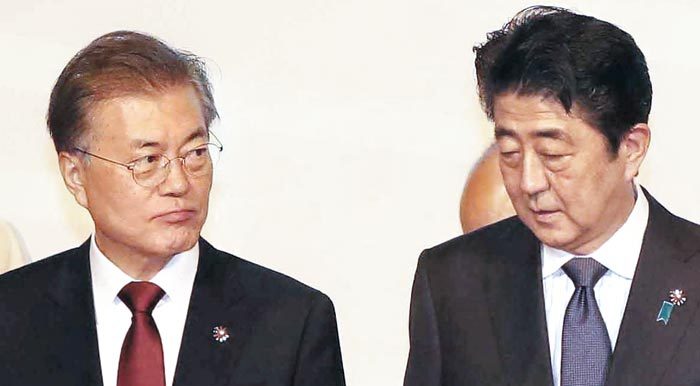July 5, 2019
The two countries have been embroiled in an economic tit-for-tat in recent weeks.
South Korea on Thursday delivered a stern warning to Japan regarding restrictions on exports of high-tech materials to Korea, calling Japan’s decision a breach of international law and vowing “corresponding steps” if necessary.
“Japan’s export restrictions are a form of political retaliation that violate international law,” the National Security Council of the presidential office Cheong Wa Dae said in a press release.
In the meeting, chaired by Presidential National Security Director Chung Eui-yong, council members vowed active diplomatic countermeasures to ensure that Japan reverses its decision, the Blue House said.
Earlier in the day, Deputy Prime Minister and Finance Minister Hong Nam-ki vowed to take “corresponding measures,” which may include lodging a complaint with the World Trade Organization.
 |
“We clearly take (Japan’s export curbs) as economic retaliation against (the Korean) judiciaries’ ruling on the forced labor cases,” Hong said in an interview with radio broadcaster CBS.
“It would be very unfortunate not only for the Korean economy, but also for the Japanese economy and the global economy.”
Given that settling disputes at the WTO is a time-consuming processes, he said Korea would also take “other necessary measures under domestic and international laws.” He did not specify details.
The fiscal policymaker’s remarks follow an announcement from the Japanese government of its intention to restrict exports of high-tech industrial materials needed to make semiconductors and computer displays. Samsung Electronics and other Korean chipmakers rely on the materials to produce components that are essential to their business operations.
Japan is also expected to remove Korea from its list of trusted buyers. To purchase the materials from Japan, Korean companies would need to undertake a complicated approval processes that can last up to 90 days.
Faced with mounting criticism from Korea, the Japanese government has asserted that its export restrictions comply with WTO regulations. It argues that each country has the right to control its exports.
“Export control is conducted by each government autonomously,” Deputy Chief Cabinet Secretary Yasutoshi Nishimura said Thursday during a regular press briefing. “Our measure complies with the WTO regulations.”
Despite Japan’s defense of its action as an exception to international trade regulations, Korea asserted that it violates the spirit of free trade that is enshrined in various international norms.
During an emergency meeting in Seoul, Trade Minister Yoo Myung-hee reiterated that Japan had violated WTO regulations, which bans export restrictions on goods. The minister also stressed that the Japanese measure contradicts a commitment to free trade that Japan made during the recent G-20 summit in Osaka.
In particular, Yoo said, the Japanese decision clashes with the Wassenaar Arrangement, to which Korea and Japan are both parties. The agreement stipulates that export controls on high-tech materials and other strategic goods must not target “specific countries.”
“We strongly demand that Japan repeal its export control measure. … If Japan is a responsible (party) to the export control treaty on strategic goods, it should respond to our calls for bilateral consultations,” said Yoo.


